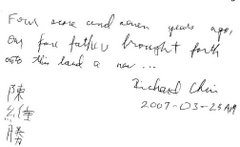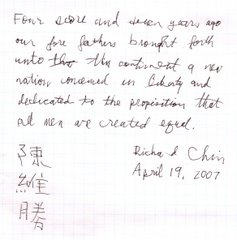According to an email we received today from a Beike administrator, the WSJ piece on Chinese Stem Cells published yesterday both misquoted and mis-represented the comments made by Ms. Bogert and Ms. Nguyen, the mothers of the boys treated at the Shenzhen Nanshan Hospital.
There is already enough controversy over the ethics of stem cell therapy before calling into question the legitimacy and effectiveness of the institutions offering such treatments. Most people acknowledge that such treatments exist in bona fide hospitals administered by credentialed physicians. However, the jury is still out on the effectiveness of stem cell-based therapies and the possible complications. Patients, their family members, doctors and other experts are interviewed for their perspective and knowledge of the issue. This is where the trouble begins.
Ms. Nguyen and Ms. Bogert are not the first people who complained about their words being taken out of context to apparently support a reporter's biased conclusion. Dr. Susan Perlman of UCLA faced a similar situation when she was interviewed and quoted in a Business Week article in February 2007. I do not know Ms. Nguyen and Ms. Bogert personally, but I have no doubt that they are honest people and loving parents. Dr. Perlman is Richard's doctor, I trust her implicitly. As far as I am concerned, none of these three women would lie about their views being misrepresented.
I don't know why journalists would deliberately violate their integrity in order to conform to a popular or more socially acceptable point of view. Just look at the majority of articles we've linked on our blog - the consensus is by far more pessimistic than not. Is it a case of schadenfreude in suggesting that the Chinese are failing, thus justifying the collective foot-dragging of the Western world in developing stem cell treatments or even researching the therapeutic possibilities? In the meantime, this type of negative press further polarizes the proponents and opponents of stem cell treatment. Current press coverage leads the proponents to believe that any progress will always be sabotaged by the opponents.
I am not one to subscribe to conspiracy theories nor am I willing to be mired in the emotional Strum und Draug that clouds this issue. We went to Shenzhen with the understanding that there was no promise or guarantee that the treatment would be effective. We went anyway because if we didn't try, we'll never find out. Has the treatment worked? Only time will tell. Even if it wasn't effective for Richard does not mean that it wouldn't help others. In the end it is up to each of us to decide what is right regardless of what others tell you or what you've read.
Tuesday, July 3, 2007
Monday, July 2, 2007
Article in today's Wall Street Journal
Just a quick post --- there's an interesting article in today's Wall Street Journal about Chinese Stem Cell Therapy. More specifically, it features the Shenzhen Nanshan Hospital, Beike and ex-Nanshan patients.
Unfortunately, the WSJ is one of those publications that requires a paid subscription in order to peruse its content. I cannot therefore post a direct link to the article. Nevertheless, for those who subscribe to the Journal either electronically and/or in paper format, the title to the article is "Seeking Hope in Chinese Stem Cells" and it is written by Nicholas Zamiska. It appears in Section B page 1.
What makes the story even more poignant is the fact the patients featured are children from California. Richard worked for 20 years in Cupertino where the Nguyen family hails from.
Unfortunately, the WSJ is one of those publications that requires a paid subscription in order to peruse its content. I cannot therefore post a direct link to the article. Nevertheless, for those who subscribe to the Journal either electronically and/or in paper format, the title to the article is "Seeking Hope in Chinese Stem Cells" and it is written by Nicholas Zamiska. It appears in Section B page 1.
What makes the story even more poignant is the fact the patients featured are children from California. Richard worked for 20 years in Cupertino where the Nguyen family hails from.
Subscribe to:
Comments (Atom)


